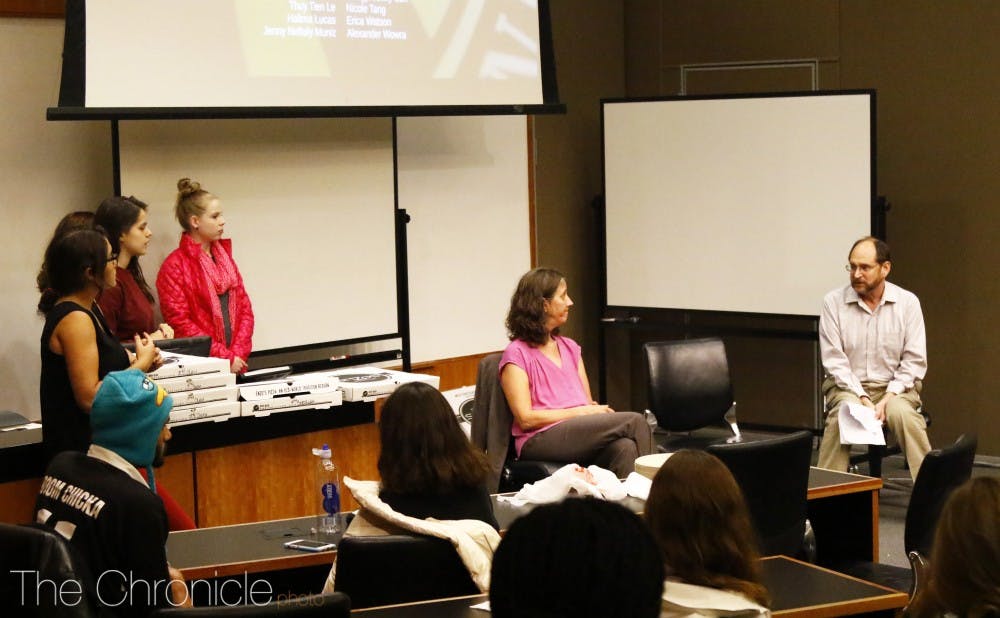A documentary released earlier this year showed universities mishandling sexual assault cases, but Duke students and administrators emphasized the importance of victims still coming forward after screening the film Tuesday evening.
Directed by Emmy Award-winning director Kirby Dick, “The Hunting Ground” offers an overview of sexual assault on college campuses and fueled a national debate when it was released earlier this year. Duke Student Government and the Women’s Center hosted a screening of the documentary and a question-and-answer session in CIEMAS, where students asked panelists about mishandled assault cases reported to administrators.
“We can always do more,” said Howard Kallem, director of Title IX compliance and one of the event’s panelists. “Student pressure is a way to make sure the University continues to pay attention to the issue. The more students can talk about this, the more we’ll be able to work together.”
“The Hunting Ground” focuses on the experiences of a number of student rape victims, recounting their experiences and university responses to sexual assault allegations. Among those featured in the documentary are Annie Clark and Andrea Pino, two University of North Carolina at Chapel Hill graduates and sexual assault survivors. Clark and Pino, who were raped while they were students, filed a Title IX and Clery Act complaint against UNC in 2013 and received nationwide attention for their efforts.
Victims throughout the documentary described the lack of support they received from universities after coming forward with their stories—students who watched the film Tuesday expressed frustration with the lack of transparency regarding sexual assault investigations.
“We have to be careful to respect the privacy of students,” Kallem said. “But when there’s a threat to public safety, that information does go out—the statistics go out.”
Much of the discussion centered on Duke’s efforts to provide resources to victims and to create a campus environment that makes students feel safe coming forward.
Kallem pointed to the Gender Violence Task Force as an example of a body working to address issues related to sexual assault on Duke’s campus. Victoria Krebs, associate dean of students for Title IX outreach and response, who works in the Office of Student Conduct, cited the two hours added to freshman orientation on sexual assault this year and the development of two shorter PACT training programs, which teach participants bystander intervention strategies.
“I have no interest in brushing anything under the rug or keeping our numbers down,” she said.
Krebs expressed concern that “The Hunting Ground” did not highlight any of the resources that are often available for victims of sexual assault on campuses. The first concern, she said, should be getting victims to safety and ensuring they have the support they need to cope with anxiety and post-traumatic stress disorder.
Junior Dana Raphael, one of the panelists and a columnist for The Chronicle, was sexually assaulted before she came to Duke. She noted that between Counseling and Psychological Services, the Women’s Center and DukeReach, she felt she got the support she needed once on campus, but still did not see enough of a conversation happening on campus about sexual assault.
Motivated to create a space for survivors to connect with each other, Raphael helped found Duke Support, a group through which sexual assault survivors can meet each other and discuss their experiences.
“Duke does the best job of being connected with students out of any university I know,” she said. “Duke’s administration wants to help and wants to provide resources.”
Sophomore Jacqueline Monetta, DSG senator for equity and outreach, said she decided to bring the documentary to campus after watching it during the summer. She emphasized that universities can still be sources of support for victims despite the film’s message.
“I don’t want students to think they can’t reach out to the school, because they can,” she said. “Not all schools are handling [sexual assault cases] poorly—the documentary definitely doesn’t highlight anything positive about what universities are doing.”
Get The Chronicle straight to your inbox
Signup for our weekly newsletter. Cancel at any time.

